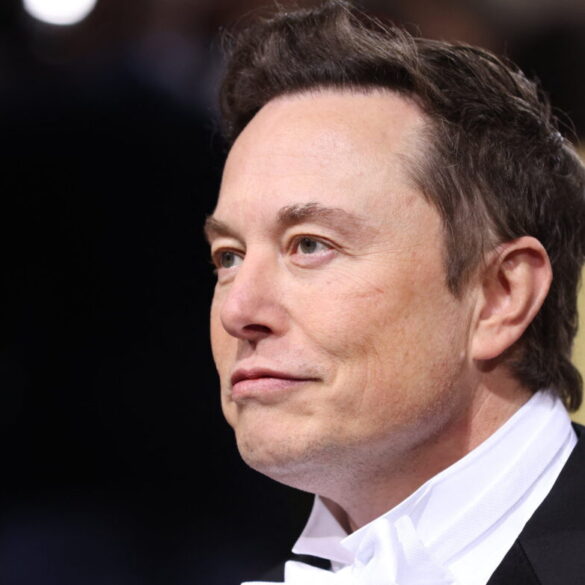
Elon Musk arrives at the In America: An Anthology of Fashion themed Met Gala at the Metropolitan Museum of Art in New York City, New York, U.S., May 2, 2022. REUTERS/Andrew Kelly
Billionaire tech mogul Elon Musk said that the deal to buy Twitter is “temporarily on hold” until detailed information comes to light that backs Twitter’s claim that bots or fake accounts make up fewer than 5 percent of users on the platform.
“Twitter deal temporarily on hold pending details supporting calculation that spam/fake accounts do indeed represent less than 5 percent of users,” Musk wrote in a tweet.
In his missive, Musk linked to a Reuters report from early May stating that Twitter had estimated in a filing that false or spam accounts represented fewer than 5 percent of its monetizable daily active users during the first quarter.
Twitter said in the April 28 filing (pdf) that “there are a number of false or spam accounts in existence on our platform.”
“We have performed an internal review of a sample of accounts and estimate that the average of false or spam accounts during the first quarter of 2022 represented fewer than 5 percent of our mDAU [monetizable daily active users] during the quarter,” the company added.
Twitter’s disclosure came days after Musk said one of his priorities would be to remove “spam bots” from the platform, which he has offered to buy for around $44 billion.
The Epoch Times has reached out to Twitter for comment.
Musk’s announcement was met with a mixed response by Twitter users, with economist Peter Schiff seeing it as proof that Musk “never actually intended to buy Twitter” and that he was “bluffing the entire time,” while trader Sven Henrich, who has been critical of fake accounts on the platform, gave Musk’s message a thumbs up, saying, “due diligence is always worthwhile.”
‘Authenticate All Real Humans’
Musk has said that, if his bid to buy Twitter is successful, he intends to authenticate all real humans on the platform.
“If our twitter bid succeeds, we will defeat the spam bots or die trying,” Musk said in an April 21 tweet. He followed that message up with a pledge to “authenticate all real humans.”
Spam bots on Twitter are automated accounts that can take actions like real humans, such as sending out tweets, following other users, as well as liking and retweeting other users’ posts. Such accounts can be programmed to try and drive traffic to a product or service as part of a commercial endeavor or spread content as part of a social or political influence operation.
While Twitter allows some bots to operate on its platform as long as they are labeled as automated accounts, Twitter does not allow spam bots and has policies in place to try and eliminate them.
Permissible bots can be used for benign purposes like broadcasting information about adverse weather events or emergencies. Malicious spam bots, on the other hand, have been used to spread content containing malware or subjecting users to other scams.
‘Definitely Their Enemy’
Musk’s plans to reform Twitter include trying to clean up the platform of spam bots. In an April 25 statement, Musk spoke of “enhancing the product with new features, making the algorithms open source to increase trust, defeating the spam bots, and authenticating all humans.”
“If someone is operating a bot and troll army, then I am definitely their enemy,” Musk said at a Met Gala in early May.
Some prominent Twitter users have backed Musk’s effort to cleanse the platform of spam bots.
“You have hit the nail squarely in the head with these tweets,” wrote Chief Investment Officer at Hayman Capital Management, Kyle Bass, in a tweet commenting on Musk’s pledge to tackle the spam bot problem.
“The fact that spam bots (Chinese, Russian, etc) overwhelm real conversations on Twitter degrades the platform and is designed to spread propaganda into the West. It’s time to demand authentication and delete bots,” Bass added.
While reining in spam bots is sure to be hailed by users concerned about their malicious or fraudulent activity, a tougher crackdown could have an adverse impact on Twitter’s total user count.
Twitter had 229 million users who were served advertising in the first quarter of 2022.
‘Inclusive Arena for Free Speech’
Musk has said his aim in seeking to buy Twitter is to take the company private and transform it into an “inclusive arena for free speech.”
The takeover attempt is not about making money, Musk has insisted, but to affect a number of changes to the platform and reduce the “civilizational risk” to freedom and democracy from what Musk has described as Twitter’s excessive and opaque restrictions on expression.
Besides seeking to crack down on spam bots, Musk has vowed to make the algorithm open source to bolster transparency, while looking to shift the content moderation policies towards erring on the side of more free speech.
Musk has also spoken out against permanent suspensions on the platform, suggesting he would lift Twitter’s ban on former President Donald Trump if his bid to buy Twitter and take it private succeeds.
“Permanent bans should be extremely rare and really reserved for accounts that are bots, or scam, spam accounts,” Musk said at an event hosted by the Financial Times.
“I do think it was not correct to ban Donald Trump. I think that was a mistake,” he added.
